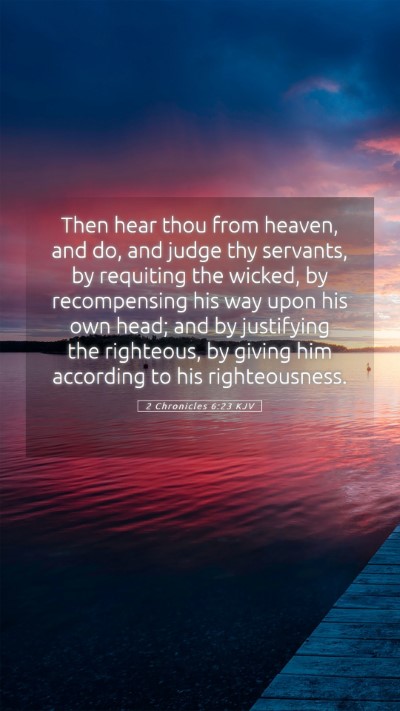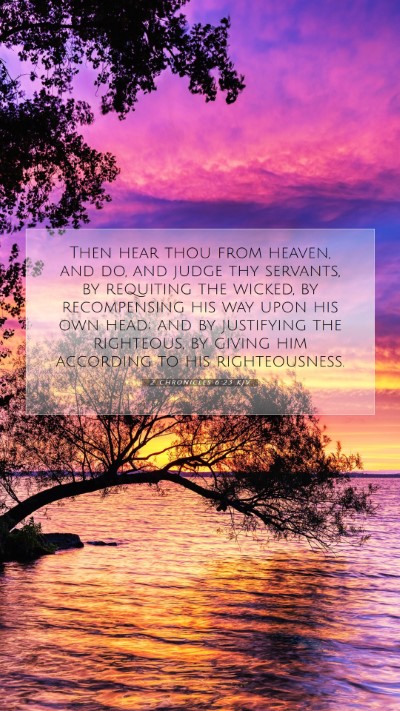Bible Verse Commentary on 2 Chronicles 6:23
Verse: 2 Chronicles 6:23 - "Then hear thou from heaven, and do, and judge thy servants, by requiting the wicked, by recompensing his way upon his own head, and by justifying the righteous, by giving him according to his righteousness."
Bible Verse Meanings and Interpretations
This verse is part of King Solomon's prayer of dedication for the temple he built in Jerusalem. The prayer reflects a profound understanding of God's justice and mercy.
God's Responses to Human Actions
The verse underscores the principle that God hears and responds to the prayers of His people. As noted by Matthew Henry, this idea emphasizes God's omnipresence and His willingness to listen when His people seek His guidance and intervention.
Public Domain Commentaries Insights:
- Matthew Henry: He highlights that Solomon asks God to judge with righteousness, implying that God’s judgment is based on justice, rewarding the righteous and punishing the wicked accordingly.
- Albert Barnes: He interprets this as a call for divine justice within the community, where God is expected toact as the ultimate judge among His people, ensuring that moral order is maintained.
- Adam Clarke: Clarke emphasizes the necessity of divine intervention in human affairs and the assurance that God’s justice will prevail over human injustices.
Understanding the Nature of Divine Judgment
In this petition, Solomon acknowledges that God’s judgment involves two key aspects: punishment for the wicked and justification for the righteous. This duality reflects profound biblical themes of accountability and divine justice.
- Requiting the Wicked: This refers to God’s role in ensuring that those who act unjustly will receive consequences for their deeds. Solomon is asking for God's intervention to bring about justice.
- Justifying the Righteous: This assures that those who live rightly according to God's laws will be recognized and rewarded. It establishes a foundation for hope and moral integrity among the faithful.
Key Themes in 2 Chronicles 6:23
- Divine Justice: The emphasis on God’s balanced judgment over humanity’s actions.
- Accountability: Highlighting each individual's responsibility for their actions and their consequences.
- Prayer and Supplication: The importance of praying for divine guidance and justice.
Cross References
This verse relates to several other passages in Scripture that discuss God’s justice and judgment:
- Psalm 7:9: "Oh, let the wickedness of the wicked come to an end; but establish the just: for the righteous God trieth the hearts and reins." - A reflection on the theme of divine justice.
- Romans 2:6: "Who will render to every man according to his deeds." - Echoing the principle seen in Solomon’s prayer.
- Matthew 12:36: "But I say unto you, That every idle word that men shall speak, they shall give account thereof in the day of judgment." - Underlining accountability for one's actions before God.
Application of the Verse in Daily Life
Understanding this verse can have significant implications for personal and community life:
- Promotion of Justice: Encourages believers to advocate for justice in their communities, recognizing that God is a God of justice.
- Encouragement for the Righteous: Inspires individuals to live righteously, trusting that God sees and will reward their efforts.
- Power of Prayer: Reinforces the importance of prayer in seeking God’s direction and judgment in life's situations.
Conclusion
2 Chronicles 6:23 serves as a powerful reminder of God’s nature as a just judge. Its teachings about accountability, justice, and the importance of prayer are refreshing insights for anyone engaging in Bible study or looking to deepen their understanding of Scripture. Utilizing resources such as Bible study guides or engaging in Bible study groups can enhance the understanding and application of these profound biblical principles.


